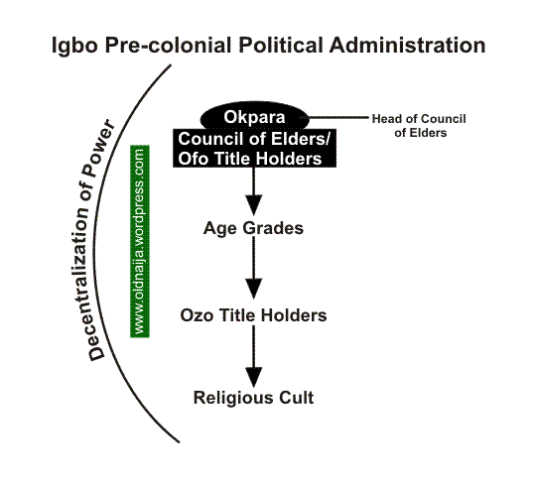Back to: GOVERNMENT SS2
Welcome to class!
In today’s class, we will be talking about the pre-colonial political system in Nigeria: Hausa/Fulani political system, Igbo political system. Enjoy the class!
Pre-Colonial Political System in Nigeria: Hausa/Fulani Political System, Igbo Political System

CONTENT
- Hausa/Fulani Political System.
- Igbo Political System.
PRE-COLONIAL ADMINISTRATION IN HAUSA/FULANI LAND
Historical background of the Hausa
The Fulani assumed the political leadership of the Habe (Hausa) states in the 19th century after the jihad war led by Othman Dan Fodio. He established the Sokoto caliphate, which was highly politically centralized.
He introduced a new system of selecting rulers known as Emirs to rule the caliphate. Sokoto and Gwandu were made two headquarters for all emirates as each Emir owed allegiance to Othman Dan Fodio and his representatives at Sokoto and Gwandu.
POLITICAL ADMINISTRATION
- The Emirate: The caliphate was divided into emirates headed by an Emir possessing almost all powers. He was an authoritarian ruler. He made laws and maintained law and order according to Islamic rules. He was assisted by several advisers. These are:
- The Waziri- he was the head of all the officials.
- The Galadima- He is in charge of the capital.
- The Madawaki- He was the commander of the army.
- The Dogari- He was in charge of the treasury
- SarkinRuwa- the River fishing official.
- SarkinFada- The head of the palace workers.
- SarkinPawa- The head of all butchers.
- Yari- Official in charge of the prisons.
- The legislative organ: The Muslim law known as Sharia was applied throughout the emirate. The law was regarded as the law of God and supreme.
- The Executive organ: The Emir was authoritarian in nature. Though he had a council of adviser, he could accept or reject their advice.
- Judicial organ: The laws were based on sharia laws and the Alkali judges administered them. Some minor cases were passed to the village heads to settle. Criminal and land cases were for the Emir to decide as long as Sharia laws dealt with civil cases.
- District administration: Each emirate was divided into district headed by an official appointed by the Emir called Hakimi.
PRE-COLONIAL ADMINISTRATION IN IGBO LAND

The Igbo system had no central authority like the Yoruba and Hausa. Different groups shared power and it involved the general participation of people in governance. They practice a form of direct democracy.
FEATURES OF IGBO POLITICAL SYSTEM
- It was a decentralized and segmented system.
- It was republican. No individual had hereditary rights to political office.
- The system was democratic as there was the principle of equality and social justice.
- There was no centralized power. No one was a political ruler.
- Women played a significant role in government through, the Umuada (daughters of the kindred)
STRUCTURAL ORGANISATION OF THE IGBO POLITICAL SYSTEM
- The Village Administration: The Igbo political system was based on the village as a political unit. Each village was made up of families. Each family head held the Ofor title and they all formed the council of elders, which govern the village. The oldest Ofor title holder was referred to as the Okpara and presided over the council of elders meeting where decisions affecting the people are taking. During village meetings, every adult was expected to participate.
- The Executive: The affairs of the village were discussed by the heads (council of elders). Every adult had the power to contribute.
- The Legislature: The villagers made laws themselves. The age-grade could make laws, which the elders accepted.
- The Judiciary: Family heads settle the dispute between families. Serious cases were referred to the council of elders and the Okpara.
- The Age Grade: Some young men belonged to the same age group. They were involved in the administration of the village and perform public duties like clearing of parts, road etc., they maintained security and helped in the implementation of policies made by the council of elders.
- The Ozor Titleholders: Some wealthy and influential men took the Ozor title, which was very expensive. The society respected such men and they could join the council of elders to debate on issues affecting the people.
- Women Association: They participated in settling disputes as they served as a powerful pressure group. They socialized with their young ones by inculcating in them good morals, political values and norms. They stood against corruption and oppression.
GENERAL EVALUATION
- Describe the composition of the village assembly in the Igbo pre-colonial political system
- Discuss the roles of the Ozor title holders in the Igbo pre-colonial system.
- Define Totalitarianism
- Give 5 features of totalitarianism
In our next class, we will be talking about the Pre-Colonial Political System: Yoruba Political System. We hope you enjoyed the class.
Should you have any further question, feel free to ask in the comment section below and trust us to respond as soon as possible.

I gained something thanks to you
like a good evening
hi good evening sir
Very useful well done
i dont like it it cant highlight
I love it